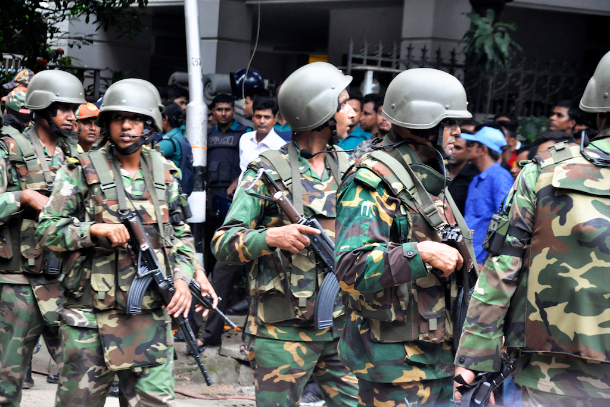Two years after worst attack in Bangladesh’s history, suspects brought to justice and police better at curbing militant threats

Bangladeshi soldiers march in front of the Holey Artisan Bakery cafe in the Gulshan diplomatic area of Dhaka in this July 2, 2016 file photo. Five militants armed with guns, bombs and knives massacred 20 cafe guests, mostly foreigners, in the deadliest attack in Bangladesh’s history. (Photo by Stephan Uttom/ucanews.com)
Armed with guns, bombs and knives, the militants murdered 20 people including 17 foreigners before commandos raided the venue in the early hours of the following morning in what was known as Operation Thunderbolt. All five militants and one cafe worker were killed. Lessons learned but more needed Retired Brigadier M. Shakhawat Hossain, a security analyst, said the nation has learned a number of positive lessons from this brutal episode in its history. “The government has adopted a ‘zero tolerance’ policy and law-enforcement agencies are more active and efficient about nipping militant threats in the bud,” Hossain told ucanews.com. “There has been much research conducted into how and why this attack happened. Most importantly, people are now more aware of militancy,” he said. 
Anxious families wait nearby as their relatives are held hostage inside the Dhaka cafe two years ago. (Photo by Stephan Uttom/ucanews.com) Bangladesh has been quite successful in spreading a counter ideology to tackle radicalism but more needs to be done, he added. “It’s true militancy has been neutralized but we don’t have any reason to be complacent. We must stay vigilant,” he said. Dr. Benedict Alo D’Rozario, a Catholic development expert, agreed some good had resulted from one of the blackest marks in the country’s modern history. “The Holey Artisan attack forged a stronger sense of unity among the public, who came together to condemn it and call for justice,” he told ucanews.com. “By our standards, pressing a charge sheet after two years in such a complex case is surely a milestone for our legal and justice system,” added Dr. D’Rozario, who formerly served as the executive director of Caritas Bangladesh, a Catholic charity arm. By moving quickly, the justice system salvaged its pride and the public trust against long-running allegations of “justice delayed, justice denied,” he said. The nation has also met with success in helping to develop a social movement against militancy, he said. “Educational institutes now have monitoring systems in place so if, for example, a student is absent for three days everyone gets involved in looking for them and makes sure the police are informed,” he said. “Moreover, the main reasons for the Dhaka attack have been identified and efforts are being made to eradicate these core factors from families, society and the political arena.” A sharp rise in Islamic militancy in Muslim-majority Bangladesh has seen about 50 people killed since 2013 including atheist bloggers, writers, publishers, liberal academics, religious minority leaders and foreigners. The culprits are Islamic extremists who have pledged allegiance to transnational terror outfits like Al-Qaeda and the Islamic State (IS), experts say. In response, law enforcement agencies have launched a series of crackdowns, including 30 successful raids, and killed about 80 suspected militants while arresting dozens of militant leaders and operatives.
